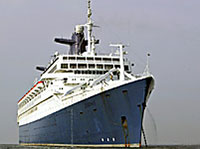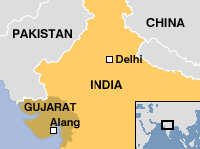India lets 'toxic' vessel anchor
by BBC News (UK)
 |
 |
 |
 |
| |
 |
|
| |
It is still not clear where the Blue Lady will be broken – AFP |
|
 |
 |
 |
| |
 |
|
 |
 |
 |
|
| |
5 June 2006 –
The Indian Supreme Court has allowed the asbestos-lined ship, Blue Lady, to enter the country's territorial waters.
Environmentalists say the vessel, which is due to be dismantled in India, is carrying 900 tonnes of toxic waste.
The court on Monday accepted the recommendations of an expert committee that the ship be anchored at the Alang breaking yard in the state of Gujarat.
The committee said that the ship should also be allowed to anchor in Indian waters so that it could be inspected.
'Not safe'
Officials say the ship will be inspected by the high-level committee of technical experts on shipwrecking.
The court said that the committee would verify the amount of contaminants on board, and report their findings.
A decision would then be made over whether or not work on scrapping the vessel could be carried out safely.
Environmental groups are opposed to the ship's entry into India, saying it contains hundreds of tonnes of asbestos and other toxic material.
The former cruise liner, originally named the SS France, was banned from Bangladeshi breaking yards in February.
Campaigners say that the Alang ship breaking yard in Gujarat does not have sufficient technology to handle such toxic waste safely, and that the health of workers there would be put at risk.
Accidents
A spokesman for the campaigning group, Ban Asbestos Network in India, said that the court order does not mean that permission has been given for the ship to be dismantled in India.
Gopal Krishnan told the BBC the court gave its order on humanitarian grounds because 13 Indians are part of the crew, and they would have faced a shortage of food and other essential materials.
He said that there was also concern that the 46,000-tonne cruise liner would have suffered damage in the sea during the monsoon.
But Mr Krishnan argued that the court had not taken the correct legal matters into account when making its decision.
He said the ship had violated international conventions because it was laden with more than 1,200 metric tonnes of asbestos.
In February, France recalled its decommissioned warship, Clemenceau, following widespread protests in India.
It, too, was due to be broken by ship breakers in Alang.
A report by Greenpeace in December said that thousands of ship-breaking industry workers in India, China and Pakistan had probably died over the past two decades because of accidents related to exposure to toxic waste.
FAIR USE NOTICE. This document contains copyrighted material whose use has not been specifically authorized by the copyright owner. The Basel Action Network is making this article available in our efforts to advance understanding of ecological sustainability and environmental justice issues. We believe that this constitutes a 'fair use' of the copyrighted material as provided for in section 107 of the US Copyright Law. If you wish to use this copyrighted material for purposes of your own that go beyond 'fair use', you must obtain permission from the copyright owner.
More News
|